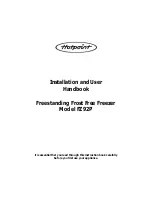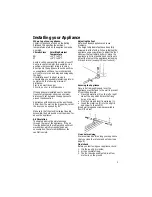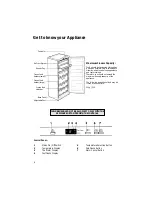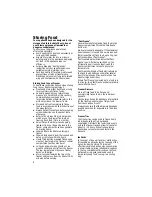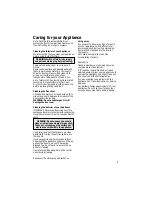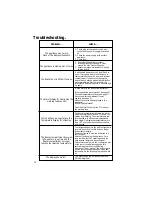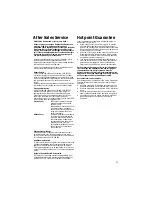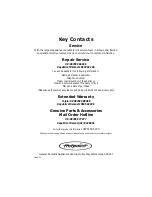
Storing Food
Your appliance has been designed for the
storage of edible foodstuffs only, do not
use to store poisonous, flammable or
dangerous substances.
To ensure your appliance operates as
efficiently as possible:
●
Avoid opening the doors unnecessarily or
for longer than needed.
●
Allow hot or warm food to cool down
before placing in the appliance, as placing
hot food in the appliance reduces
efficiency.
●
Follow packaging “best by/use by”
instructions or your suppliers advice on
suitable maximum storage time.
●
Pack foods airtight, to retain moisture and
prevent flavour / odour transference.
Plastic bags, aluminium foil, plastic stretch
wrap and containers with lids are ideal.
Storing Food in your Freezer
Follow these recommendations when storing
food in your freezer compartment:
●
Freeze and store either fresh food or long
term commercially frozen foods.
●
Generally speaking long term storage
means up to 3 months but this can vary,
so always follow your supplier’s
recommendations otherwise refer to the
pictorial guide on the drawer fronts.
●
Store and defrost commercially frozen
food in accordance with the instructions of
the manufacturer.
●
Always defrost frozen food before cooking
unless instructions on the packet state
otherwise.
●
Refer to the storage life pictorial guides,
which are on the drawer fronts, when
freezing fresh food (Time in months).
●
Select frozen food last when shopping,
transport in a cool bag and place in the
freezer compartment as soon as possible
on arriving home.
●
Label and date food before placing in
freezer.
●
Thawed food should be either cooked and
eaten or re-frozen within 24 hours.
●
Liquid filled bottles or sealed fizzy drinks
must not be stored in the freezer or chiller
compartment, as they may burst.
●
Lollipops and water ices should not be
given to children directly from the freezer.
The low temperature may cause ‘freezer
burns’ on their lips.
●
Store ice cream towards the top of the
freezer and remove from the freezer 15-30
minutes before serving.
"Fast Freeze"
Several hours before placing fresh food in the
freezer compartment, Press the ‘Fast Freeze’
button (6)
4-6 hours is usually adequate. If the maximum
freezing capacity is used, 24 hours is required.
(Small quantities of fresh food, up to 2kg, can
be frozen without ‘Fast Freeze’).
‘Fast Freeze’ display (4) indicates that ‘Fast
Freeze’ is on. After being switched on, the
refrigerating unit runs constantly and the
freezer compartment drops to a very low
temperature.
‘Fast Freeze’ switched off automatically when
the fresh food has frozen solid (after several
hours for small quantities, no more than two
days for large quantities).
Where ‘Fast Freeze’ is selected but no food is in
the freezer, then ‘Fast Freeze’ will automatically
cancel after 26 hours.
Freezer Drawers
Store all fresh food to be frozen and
commercially frozen food in the individual
baskets.
Use the large frozen food basket preferentially
for the freezing and storage of larger food
items, such as poultry etc.
Always make sure that the drawers have been
pushed back in as far as possible, to their stop
position.
Freezer Tray
The freezer tray can be used to freeze items
individually, such as fruit, herbs and
vegetables. Distribute the food items evenly
across the freezer tray and allow to freeze for
about 10 - 12 hours. When frozen place in
freezer bags or containers and store in the
baskets.
Ice Packs
In the event of a power failure or malfunction,
refreezable ice packs delay the thawing of the
frozen food being stored. This is most
effectively achieved and energy consumption
is minimized, by placing refreezable ice packs
in the top compartment directly on the food.
Refreezable ice packs can also be used to
temporarily keep food cool, eg. in a cooling
bag.
8

